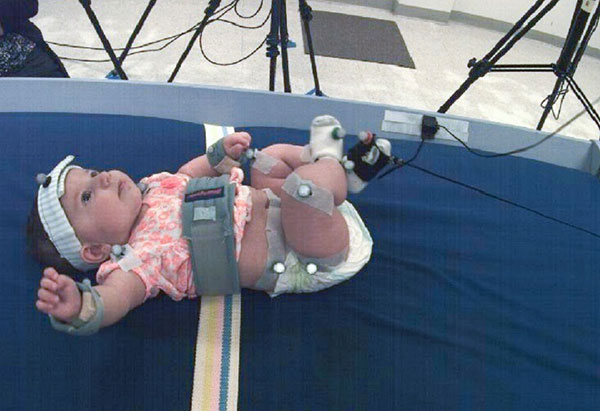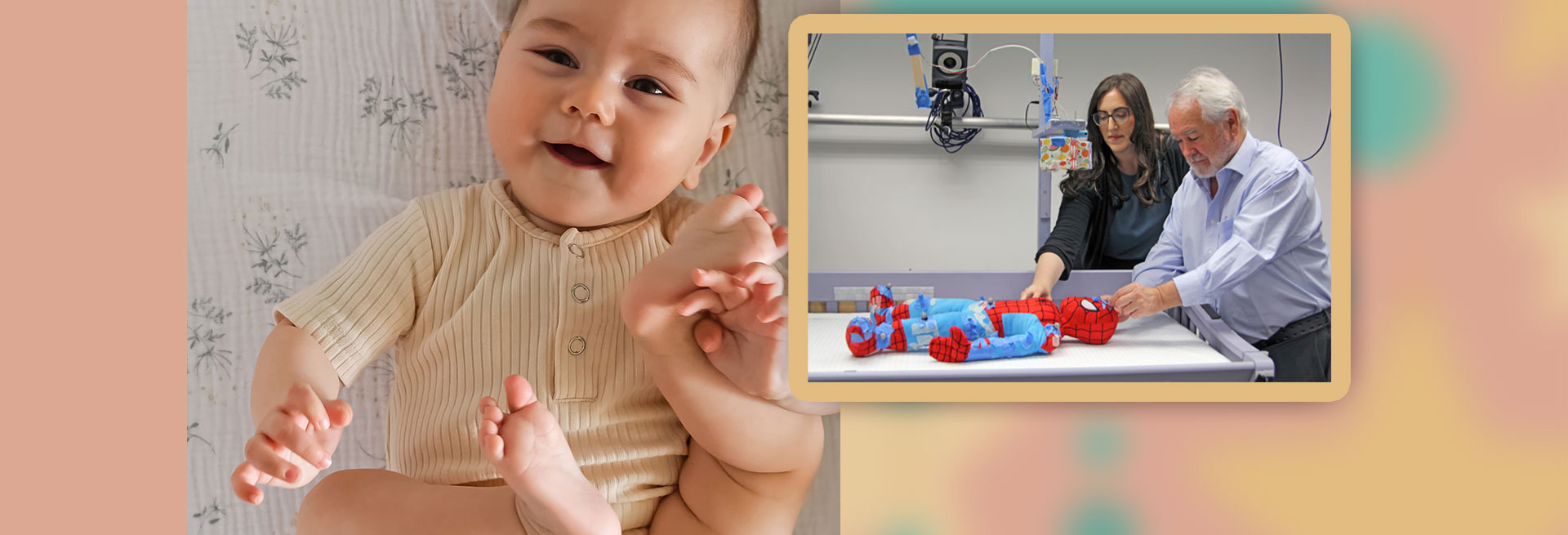By Wynne Parry
Whether flicking on a light switch or reaching for a drinking glass, we all act with agency — that is, we take actions intended to produce consequences we desire. To examine the emergence of this easily overlooked yet fundamental ability, a team at Florida Atlantic turned to babies.
Writing in the Proceedings of the National Academy of Sciences, the researchers document babies realizing that their kicking could spin a mobile, which was connected to one of their feet by a string.
“Our entry point was to look at the transition between spontaneous and intentional behavior, where it’s very clear the infant actually makes something happen in the world,” said J. A. Scott Kelso, Ph.D., Eminent Scholar in Science and professor of psychology and biological sciences in the Charles E. Schmidt College of Science.
AGENCY EMERGES IN 3D
Over the centuries, scientists have defined natural laws to explain the physical world. Yet, these rules fail to fully explain the purposeful actions of living organisms.
“We could say that agency is something that human beings have. But in the present state of science, agency exists nowhere within standard conventional physics and chemistry, and is somewhat controversial in biology,” said Kelso, adding that he and his colleagues hope to extend natural law to include agency, the emergence of which he describes as a self-organizing dynamical process.
In this study, the researchers explore how this happens through the interaction of living things — in this case babies — with their environments.
“The background to the experiment that we did is quite old,” said first author Aliza Sloan, Ph.D., a research assistant professor in the Human Brain and Behavior Lab, Florida Atlantic’s Center for Complex Systems and Brain Sciences, College of Science. “It was one of the first paradigms used to show that young babies could understand relationships and remember.”
For the experiment, researchers worked with 16 3-to-4 month-old babies. The babies were placed on their backs below a mobile connected to one of their feet. While in the past, researchers tallied infants’ kicks on a clipboard, the Florida Atlantic team tracked the motions of the baby and the mobile in three dimensions 100 times per second using leading motion capture technology.
Over the course of interaction with the mobile, a healthy baby’s kicking typically increases. In the past, this change was thought to be evidence of simple reinforcement — that is, the mobile’s movement stimulates the babies to kick more, without them necessarily understanding that they control it. Sloan and Kelso suspected that the babies were doing more than responding to a sight they liked. Rather, the infants were realizing that they had the power to move the mobile.
POWER OF PAUSES
In their analysis, the team noticed that the babies frequently paused their kicking, waiting for the mobile to stop moving before beginning to kick again. But if babies were merely responding to the motion of the mobile, as once thought, they should increase their kicking, Sloan said.

These pauses appear key to the infants’ discovery of their own agency, according to the researchers. When they stopped kicking and the mobile stopped moving, the infants could see that they alone were moving it. And for several babies, bursts of kicking followed periods of relative calm.
Sloan also devised an analytical “a-ha detector.” By pinpointing the greatest increase in a baby’s rate of movement, she could identify when a baby suddenly realized he or she could control the mobile. Distinct patterns emerged with some babies experiencing their a-ha moments more quickly and others taking longer. One infant steadily increased her kicking but did not show the burst of activity linked with the discovery of her agency.
On its own, the infants’ experience with the mobile is likely only a small step toward a bigger realization. “There are probably plenty of experiences that over time coalesce into a more stable sense of self as an agent,” Sloan said.
As these infants grow, that knowledge will become a given, like the effects of gravity.
“We humans take a lot for granted as we’re wandering around trying to understand the world we live in,” Kelso said. “My thought on this is: You’re an agent, but you haven’t thought much about what underlies your own agency. Here is a window into it.”
